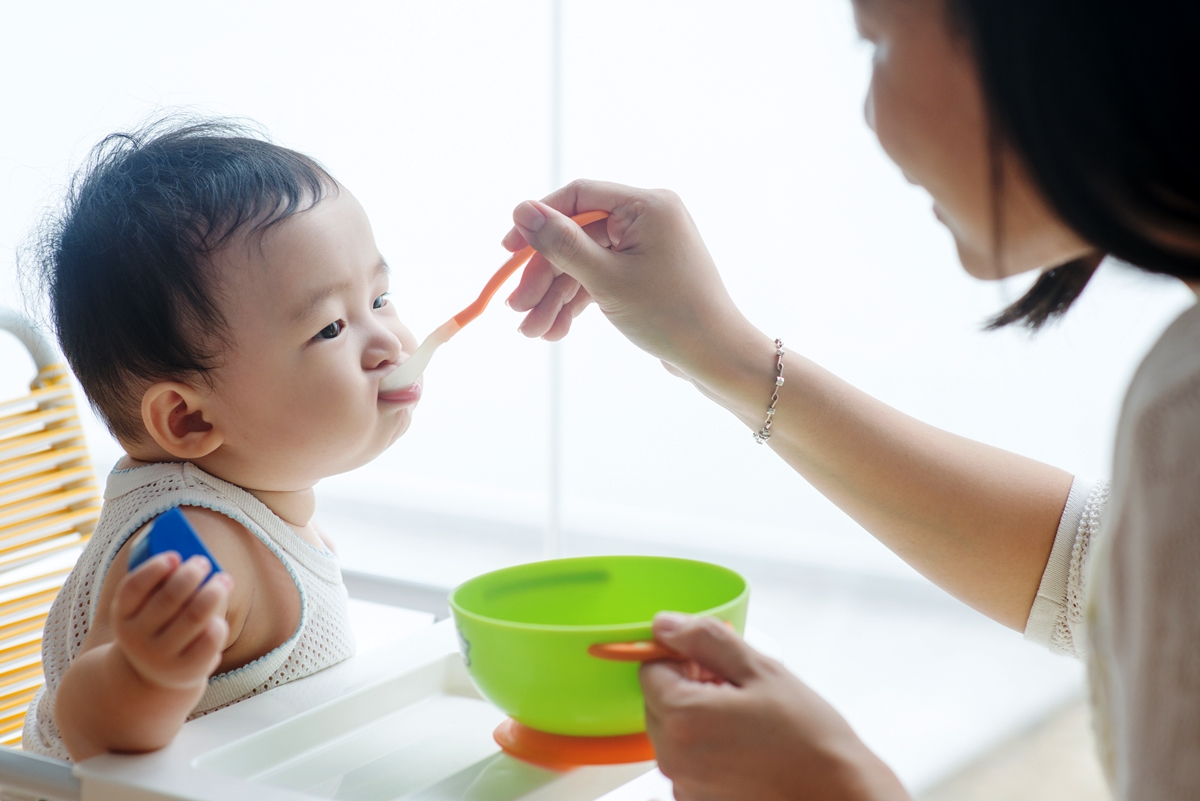Healthy Family, Happy Life Resources
In this section:
Supporting your baby through developmental stages
The ‘Blue Book’
The ‘Blue Book’ is a personal health record book given to parents of children born in NSW. The Blue Book contains valuable information about a child’s key health, development and growth milestones. The Blue Book is available in English or in Chinese.
Your doctor (GP) or Child and Family Health Nurse uses key milestones to track your child’s development between 6 weeks to 5 years of age. Key milestones include:
-
• Fine motor. For example, eating
-
• Gross motor. For example, crawling or walking
-
• Social skills. For example, playing with others
-
• Cognitive skills. For example, problem solving
-
• Language/speech skills. For example, talking and listening
Child and Family Health are free and do not require Medicare. Nurses can support new parents with all aspects of their child’s development including feeding, sleep & settling, behaviour and adjustment to parenting. There are easy to access clinics across 7 local government areas (including Woollahra, Waverley, Randwick, Bayside, Kogarah, Hurstville and Sutherland Shire). Similar services may be available across your local area. For more information visit the Child & Family Health Nursing Service website by clicking here.
For more information about key development and growth milestones see available factsheets in English, or in Chinese.
LOVE Talk SING Read PLAY APP
LOVE Talk SING Read PLAY APP is available in both English and Chinese and contains information for every family to help their children learn and develop. It offers:
-
• Help on how to help your children learn and develop
-
• Has an option to add photos to create a memory book
-
• Send reminders for immunisations and blue book checks
-
• Download the App, set up your profile and select your language. For Apple iOS devices download here and for Android devices download here.
Parenting Booklets
Parenting booklets to guide the development of healthy behaviours, such as healthy eating and active play, across a baby’s key developmental stages between 0 – 6 months are available in:
-
• 0 – 2 months (in English or in Chinese)
-
• 2 – 4 months (in English or in Chinese)
-
• 4 – 6 months (in English or in Chinese)

Breastfeeding
Breastfeeding is both normal and natural, and a valuable experience between a mother and child. Breastfeeding provides all the essential nutrients for your baby for healthy growth and development. Exclusive breastfeeding is recommended to 6 months of life and continued after the introduction of family foods for up to 12 months or as long as desired. Like anything, breastfeeding can take practice. The right support can help you establish a successful breastfeeding relationship.
Breastfeeding Confidence brochure (available in English or in Chinese) is a quick guide on the essentials of breastfeeding including:
-
• What to expect with breastfeeding
-
• How to position your baby for feeding
-
• How often to feed your baby
-
• How to look after yourself during breastfeeding
How Breastfeeding Works brochure (available in English or in Chinese) provides information of a range of topics including:
-
• Expressing & storing breastmilk
-
• Colostrum
-
• Sore nipples
-
• Weaning
-
• Engorgement
-
• Increasing supply
-
• Working & breastfeeding
Breastfeeding is a new skill for both mother and baby. Prior to birth and in the early days and weeks with your baby there are lots of places to turn to for support including:
-
• Your midwife or doctor
-
• Your local Child & Family Health service who can provide both drop in or appointment based breastfeeding support with breastfeeding specialist nurses free of charge
-
• Breastfeeding workshops offered through hospitals and Child and Family Health Centres
-
• Private lactation consultants www.lcanz.org
-
• Breastfeeding education and support is also available for partners.
Breastfeeding helpline
The National Breastfeeding Helpline run by the Australian Breastfeeding Association (ABA) is a free service available 24 hours a day, 7 days a week.
• Visit: https://www.breastfeeding.asn.au/ or call 1800 mum 2 mum (1800 686 268) to access support from trained counsellors to provide you with support and knowledge about how breastfeeding works. If you require an interpreter, call the Translating and Interpreting Service (TIS National) on 131 450 and ask them to telephone Breastfeeding Helpline on 1800 686 268.
Feeding
Parents play a big role in developing a child’s healthy relationship with food. It is important to understanding your baby’s hunger cues and fullness and to allow your child to learn to eat independently. A parent’s role in feeding includes what food is served, when it is served and where it is served. The child’s role in feeding includes whether the food is eaten and how much is consumed.
Introducing solid foods
Most babies are ready for solid foods around 6 months of age. At this age babies need more nutrients than what they receive from breastmilk or infant formula alone.
Foods introduced at this age should be iron-rich foods and offered in a range of textures such as mashed or grated, or offered as finger foods (i.e. cut up fruits). Breastmilk or infant formula is still necessary to provide during this time to offer important nutrients and for comfort.
A variety of foods from all food groups can provided at around 6 months of age and include:
-
• Iron enriched rice cereal, porridge or congee
-
• Full-fat cheese, custards and yoghurt
-
• Fruit, for example, cut up banana, mango, watermelon
-
• Cooked vegetables, for example, mashed pumpkin or potato
-
• Minced or stewed red meat, poultry or fish
-
• Cooked legumes, such as beans or tofu
-
• Bread, pasta
See more information about introducing solid foods in English or in Chinese.
Feeding from 12 months
Most children should be eating a variety of foods from the five food groups from the Australian Guide to Healthy Eating (in English or in Chinese) including:
-
• Grain and cereal foods including mostly wholegrain options
-
• A variety of different types and colours of fruits and vegetables (including legumes/beans)
-
• Dairy foods including full fat milk, yoghurt and cheese or alternatives
-
• Food high in protein and rich in iron including lean meats, poultry, fish eggs and tofu
-
• Water

Changing from a bottle to cup
From 6 months old it is recommended to introduce your baby with water (boiled, then cooled) when they start on solid foods. Aim to provide ‘sippy cups’ without a valve or teat that has two handles for your baby to hold independently. Evidence suggests that the long term use of a bottle is linked to tooth decay and iron deficiency.
Tips to help your baby learn to use a cup and avoid mess include:
-
• Show your baby how to use the cup by guiding to their mouth
-
• Let your baby play with an empty cup to get a feel for it
-
• Add just a small about of liquid to the cup to avoid large spills
-
• Use a cup yourself at meal times to show them you like using a cup too
For more information see the ‘Teach your baby to drink from a cup’ factsheet in English or in Chinese.
Healthy teeth and gums
Babies first teeth appear at 6 to 10 months and often all teeth arrive by 3 years of age. Caring for children’s teeth at an early age sets up good dental habits for life.
Some important tips to consider to keep babies teeth and healthy include:
-
• Brush teeth twice a day with a soft toothbrush
-
• Avoid sugary drinks e.g. fruit juice and offer water
-
• Visit the dentist at around 12 months of age or when their first tooth appears
Sleeping
Sleep is important for healthy growth, development and learning.
For newborns, it the time to get to know your babies cues for sleep and feeding, and developing flexible routines around them. For more information to help to understand newborns need and develop routines see factsheet in English or in Chinese.
As babies get older they need less sleep, more often their sleep starts to increase at night. To get more information about what to expect for sleep see factsheet in English or in Chinese.
Signs of tiredness also change as children age and this can be identified often in changes in behaviours. To understand what signs you might expect to see in your baby see the factsheet in English or in Chinese. See more information on sleep cycles, tips for bedtime and sleep routines.
Safe sleeping recommendations
Safe sleeping is important to reduce the risk of sudden unexpected death in infancy (SUDI) which is also commonly referred to as sudden infant death syndrome (SIDS).
Some key considerations for your baby to sleep safely include:
-
• Sleep baby on back from birth, not on tummy or side
-
• Keep head and face uncovered
-
• Ensure a safe sleeping environment by utilising a safe cot and mattress and avoiding the use of bulky items like pillows or cot bumpers
-
• Sleep baby in their own safe sleeping space, near an adult for the first 6-12 months of their life
-
• Breastfeed baby where possible for at least the first 6 months of life
-
• Dress your baby to be comfortably warm but not hot, to avoid overheating
-
• Don’t smoke during pregnancy or after your child is born, and don’t allow anyone to smoke near your baby
-
• Make sure anyone who looks after your baby understands these safe sleeping recommendations
For more information see:
-
• ‘Safe sleeping’ factsheet in English or in Chinese
-
• ‘Safe sleeping recommendations’ flyer In English or In Chinese

The importance of playtime
Play is key to your child’s learning, development, language, confidence and wellbeing. To understand more about the importance of play see more information in English or in Chinese.
How to play with your baby:
-
• Unstructured, free play is the best type of play for young children
-
• Child-led play starts with noticing what your child is interested in and then going along with it
-
• You don’t need to spend lots of money on expensive toys – babies love empty food containers, cardboard boxes, pegs and other common household items
-
• As children grow, the way they play changes, for example, as babies start walking around 12 months there is opportunity to play outdoors in parks or the backyard
-
• Current guidelines recommend that children under two years don’t have screen time other than video-chatting with people they know, like grandparents.
For more information about playtime and to access play ideas and baby games see more information in English or in Chinese
Importance of tummy time
Supervised opportunities for tummy time is an important part of physical development to:
-
• Develop strength in back and neck muscles that will improve head control and ability to move around
-
• Help prevent a flat spot developing on the back of head
-
• Support brain development when being able to see the world from different angles
At first, your baby might not like tummy time –try tummy time on your chest or across your lap. This puts less pressure on your baby’s tummy and can help with problems like reflux. This position also lets your baby see your face.
-
• You could also get down on the floor with your baby
-
• Tummy time can be tiring, especially for young babies. When your baby gets tired, roll them onto their back for a break before trying again. You can start with 1-2 minutes of tummy time, and build up to 5-10 minutes a few times a day as your baby gets used to it.
See the tummy time factsheet (in English or In Chinese) for some key tips to make tummy time interesting, fun and safe.

Raising bilingual/multilingual children
It is best to begin speaking to your child in more than one language as early in their lives as possible (from birth).
It is recommended that you only speak to your child in the language you use at home and let them get exposure to other languages (such as English) from other people. The benefits of doing this include:
-
• It can help them learn and understand culture
-
• It can help them understand English better and most children find it easier to read and learn a second language
-
• Will improve communication within your family
-
• Improves your child’s sense of cultural identity and sense of belonging
See more information of the benefits and challenges of raising multilingual children in English or in Chinese.
See more information and strategies on raising multilingual children in English or in Chinese.
Feedback
Tell us about your experience with using this webpage by answering these quick questions, please click here.



